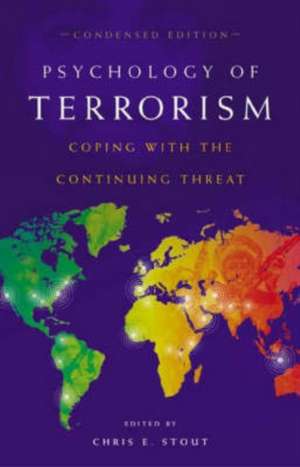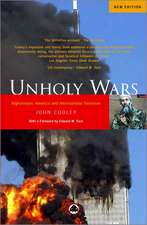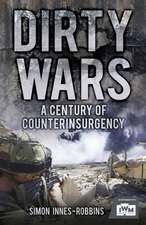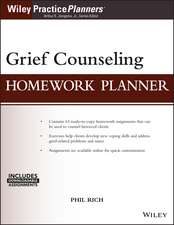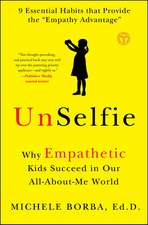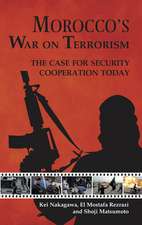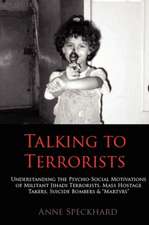Psychology of Terrorism: Coping with the Continuing Threat: Contemporary Psychology
Editat de Chris E. Stout Ph.D.en Limba Engleză Hardback – 29 iun 2004 – vârsta până la 17 ani
| Toate formatele și edițiile | Preț | Express |
|---|---|---|
| Paperback (1) | 176.45 lei 43-57 zile | |
| Bloomsbury Publishing – 29 iun 2004 | 176.45 lei 43-57 zile | |
| Hardback (1) | 209.67 lei 43-57 zile | |
| Bloomsbury Publishing – 29 iun 2004 | 209.67 lei 43-57 zile |
Din seria Contemporary Psychology
- 18%
 Preț: 308.13 lei
Preț: 308.13 lei - 20%
 Preț: 177.12 lei
Preț: 177.12 lei - 18%
 Preț: 320.87 lei
Preț: 320.87 lei - 32%
 Preț: 176.45 lei
Preț: 176.45 lei - 27%
 Preț: 366.92 lei
Preț: 366.92 lei - 27%
 Preț: 439.77 lei
Preț: 439.77 lei - 18%
 Preț: 322.21 lei
Preț: 322.21 lei - 14%
 Preț: 361.40 lei
Preț: 361.40 lei - 27%
 Preț: 345.42 lei
Preț: 345.42 lei - 24%
 Preț: 363.98 lei
Preț: 363.98 lei - 17%
 Preț: 325.05 lei
Preț: 325.05 lei - 18%
 Preț: 357.81 lei
Preț: 357.81 lei - 14%
 Preț: 356.57 lei
Preț: 356.57 lei - 34%
 Preț: 169.88 lei
Preț: 169.88 lei - 27%
 Preț: 366.69 lei
Preț: 366.69 lei - 24%
 Preț: 366.50 lei
Preț: 366.50 lei - 27%
 Preț: 345.83 lei
Preț: 345.83 lei - 13%
 Preț: 314.58 lei
Preț: 314.58 lei -
 Preț: 194.96 lei
Preț: 194.96 lei - 26%
 Preț: 359.79 lei
Preț: 359.79 lei
Preț: 209.67 lei
Preț vechi: 260.66 lei
-20% Nou
Puncte Express: 315
Preț estimativ în valută:
40.12€ • 42.00$ • 33.20£
40.12€ • 42.00$ • 33.20£
Carte tipărită la comandă
Livrare economică 07-21 aprilie
Preluare comenzi: 021 569.72.76
Specificații
ISBN-13: 9780275982072
ISBN-10: 0275982076
Pagini: 288
Dimensiuni: 156 x 235 x 26 mm
Greutate: 0.6 kg
Ediția:Condensed.
Editura: Bloomsbury Publishing
Colecția Praeger
Seria Contemporary Psychology
Locul publicării:New York, United States
ISBN-10: 0275982076
Pagini: 288
Dimensiuni: 156 x 235 x 26 mm
Greutate: 0.6 kg
Ediția:Condensed.
Editura: Bloomsbury Publishing
Colecția Praeger
Seria Contemporary Psychology
Locul publicării:New York, United States
Notă biografică
CHRIS E. STOUT is a licensed clinical psychologist serving as Illinois' first Chief of Psychological Services for the Department of Human Services/Division of Mental Health. He is also Clinical Full Professor at the University of Illinois College of Medicine's Department of Psychiatry, and a Core Faculty at their International Center on Human Responses to Social Catastrophes. He also holds an academic appointment in the Northwestern University Medical School and is Visiting Professor at Rush University. He served as NGO Special Representative to the United Nations and as an advisor to the White House under both parties. He has published or presented more than 300 papers and 27 books or manuals, many of those translated into six languages. He is the editor of The Psychoogy of Terrorism, 4 volumes (Praeger, 2002).
Cuprins
AcknowledgmentsIntroduction by Chris E. StoutUsing Psychology to Counter Terrorism at the Personal and Community Level by Chris E. StoutPsychological Issues in Understanding Terrorism and the Response to Terrorism by Clark McCauleyUnresolved Trauma: Fuel for the Cycle of Violence and Terrorism by Timothy GallimoreUs & Them: Reducing the Risk of Terrorism by Stephen D. FabickCountering International Terrorism: Perspectives from International Psychology by John M. DavisHoning a Tool Against Terrorism: Making United Nations Peace Operations More Rapid and Effective by Henry BreedPreventing Terrorism: Raising "Inclusively" Caring Children in the Complex World of the 21st Century by Ervin StaubFrom Terror to Triumph: The Path to Resilience by Edith Henderson GrotbergAppendix A: Signs, Symptoms, and Treatment of Biological AttackAppendix B: Personal PreparationAppendix C: Personal ResponseAppendix D: ResourcesIndexAbout the EditorAbout the Contributors
Recenzii
This timely book addresses a subject that may be crucial to confront if Americans are to progress beyond the cliches about why terrorists 'hate' us.. This book successfully counters the simplistic notion that terrorists are pathological personalities while acknowledging the limits of applying a psychological perspective to a fundamentally political problem. Authoritative yet highly readable, this compilation is recommended for large public libraries and academic collections that do not own the full set.
